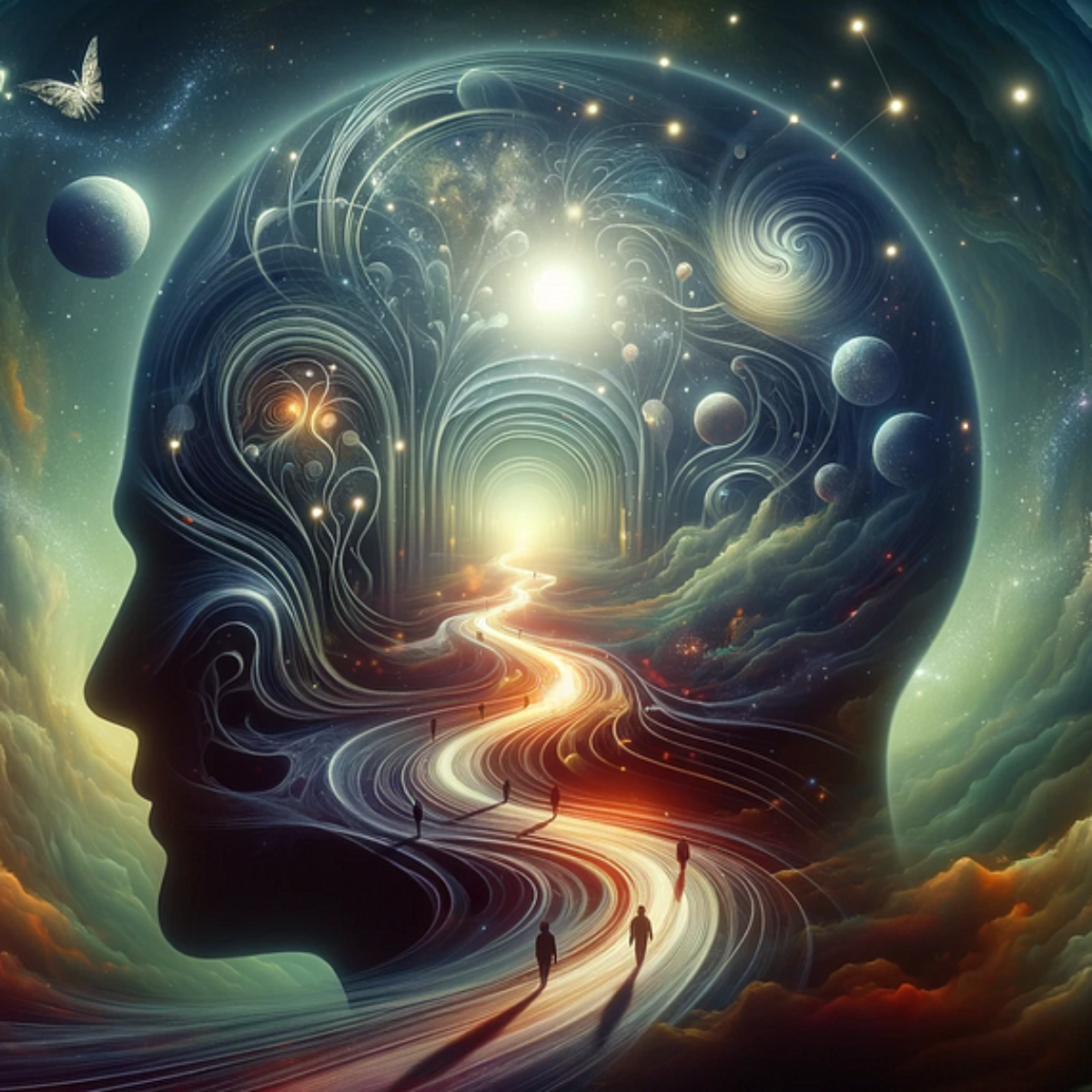Mirror, Mirror, On the Wall: How Projection Makes Puppets of Us All

Grab your snorkel —we’re about to dive deeper than a teenage diary. We ventured into that shady corner of your mind, where fears, desires, and unsung dreams lurk. You know, your shadow self – the inner drama queen we all harbor. Now, let’s shift our lens and delve into how this shadow casts its influence over our interaction with the world, particularly through ‘projection.’
Projection is like spending hours analyzing every move in The Bachelor while ignoring that your love life has more subplots than a telenovela. You’re great at guessing who gets the final rose, but have you considered the drama unfolding in your own emotional suitcase?
For the uninitiated in psychological jargon, think of projection as the mental ‘sweep it under the rug’ tactic. It’s the art of noticing all the imperfections in others while conveniently overlooking those same traits lurking in your own psyche.
Meme Morality: The Silent War of Shopping Carts
Now, here’s the thing about projection: it’s become this trendy term that’s thrown around like confetti on New Year’s Eve, but seldom is it recognized and genuinely understood within our own minds. It’s a hell of a lot easier to point fingers and notice projection in others, yet a strenuous task to confront these tendencies in ourselves.
Case in point: that white-hot rage you feel when someone has the audacity to not return a shopping cart in a grocery store parking lot. Ah, the Shopping Cart Theory—the claim that returning your cart is a testament to one’s moral fiber.
According to Scientific America, there are 5 types of people:
- Returners. These innocent souls return their carts rain or shine. They are on a mission to save the world one shopping cart at a time.
- Never Returners. They’ll happily abandon carts anywhere, probably while muttering, “That’s not my job.”
- Convenience Returners. These folks will be all noble—if they’re parked next to the cart bay or spot an attendant lurking. Otherwise? Screw it.
- Pressure Returners. Will only spring into action if someone’s around to judge them, like an attendant, or if they see that judgy neighbor that loves to talk crap in the HOA meeting.
- Child-Driven Returners. These are the parents who turn their shopping carts into mini NASCAR races. Mom says it’s a fun way to do cardio. I say it’s Mario Kart training.
But let’s get real here: is returning a cart truly a noble act? Are you seriously losing your mind over a shopping cart, or are you contorting yourself to avoid being the villain of this viral meme? Is this shadow of meme culture coercing you to conform and radiate judgment toward those who rebel against this so-called moral act?
Now before you get your blood boiling about my shopping cart moral compass, ever spare a thought for that grocery store clerk? The one trapped in the soul-crushing monotony of a job within four walls surrounded by Karens and Chads, longing for a moment under the sun.
Picture their horror when every cart is neatly tucked away, robbing them of those few extra sun-kissed minutes hunting down strays. Trust me, that grocery store clerk is silently toasting those “inconsiderate jerks” who left those lingering shopping carts scattered around the parking lot.

Your shadow universe: A galaxy not so far away
Let’s face it folks – your subconscious mind projects its flaws like a Sith Lord hosting an intergalactic PowerPoint presentation on ‘How to Be Your Worst Self.’ Let’s be honest—you’re not just a passive audience member; you’re the keynote speaker. No one aspires to be their worst self, yet we inadvertently morph into what we fear the most, thanks to the irony of our projections.
Your shadow self is basically the VIP lounge for traits you’d rather not display on your everyday guest list. Imagine Darth Vader, peering angrily through his helmet, spots a Sith intern—let’s call him Chad Vader—and says, ‘Look at this guy with his deep voice and heavy breathing. So creepy, right? And what are those?’ All this while he’s Force-choking his colleague in a staff meeting for missing a deadline on the Death Star construction project. Talk about creepy.
Your shadow self is basically the mean girl club of traits you’d rather not admit you have. It’s like hating on Chad Vader for his petty use of a lightsaber to slice open a bag of chips, all while you’re secretly battling your own urge to use the Force to make the IT guy fix the printer. In other words, it’s the pent-up disdain or loathing you have for certain qualities—qualities that you might very well possess or are doing mental gymnastics to avoid.
So, while it may be easy to laugh at or condemn ‘Chad Vader,’ we’ve all got our own “inner Chads”—parts of us that we’d rather keep hidden but that emerge in moments of frustration, temptation, or impatience. But Chad isn’t alone in his quirks. Let’s face it, many of us are guilty of similar antics.

The Great Pie Debate: Liberals and Conservatives at the Bake Sale
Imagine a grand community bake sale. On one table, the liberals have baked a multi-layered, organic, gluten-free, vegan rainbow cake, topped with ethically-sourced fruit and a sprinkle of fair-trade chocolate. They look over at the conservative table and scoff, “Ugh, look at that plain outdated pie. Not one avocado in sight.”
On the other side, the conservatives proudly display a traditional, homemade American apple pie, with a golden crust and a recipe passed down through generations. They glance at the liberal table and mutter, “For the love of Lincoln! Is that supposed to be a cake or some kind of new-age art project?
Both sides are missing the point. The liberals can’t see past the simplicity of the pie, not recognizing its rich history and tradition. The conservatives, meanwhile, are too colorblind to appreciate the creativity and inclusivity of the rainbow cake. In reality, both desserts have value and cater to different tastes.
It’s all too easy for each side to project their insecurities and criticisms onto the other. Liberals might see conservatives as being stuck in the past, while conservatives might view liberals as trendy try-hards. But just like at the bake sale, there’s room for both – the classic apple pie and the innovative rainbow cake. Yet, in the broader spectrum of life, the stakes are much higher than at a community bake sale.
Projection’s Potential for Personal and Societal Unraveling
The power of projection isn’t just a personal affair—it’s societal. When we’re unaware of our projections, we build entire narratives around them. These narratives can shape our relationships, communities, and even international dynamics. Carl Jung, the OG of shadow work said,
Everything that irritates us about others can lead us to an understanding of ourselves.
When left unchecked, these irritations can escalate from simple misunderstandings to destructive behaviors or even manifest themselves as global conflict.
Consider the rise and spread of misinformation on social media platforms. A single misconstrued post, perhaps stemming from one individual’s projected fears or biases, can rapidly gain traction. Suddenly, thousands, if not millions, are exposed to and may even believe this misinformation.
This isn’t just about harmless rumors; we’ve seen how false narratives about health crises like the COVID-19 pandemic can lead to widespread skepticism about vaccines, causing a slew of public health challenges. Or how political misinformation can polarize societies, creating deep divides and even inciting violence, as witnessed during events leading up to the Capitol riot in the United States in early 2021.
Consider the ‘Pizzagate‘ incident from the 2016 U.S. election cycle. A misinterpreted email led to a widespread conspiracy theory suggesting a pizza place in Washington, D.C. was involved in child trafficking. This baseless rumor, amplified by social media, resulted in a believer entering the establishment with a firearm, seeking to ‘investigate’ the claims.
In these instances, the act of projecting individual insecurities or biases onto larger groups doesn’t just stay in the digital realm; it has tangible, real-world consequences. It can alter behaviors, sway opinions, and in the gravest situations, lead to conflicts both internally within nations and externally between them. The challenge, then, is recognizing and overcoming these projections before they spiral out of control.

Embracing the Shadow for a Brighter Tomorrow
The antidote? It starts with self-awareness. By acknowledging and embracing our shadow selves, we can demystify our projections. We begin to see others not as reflections of our denied selves but as unique individuals with their own stories, struggles, and strengths.
By doing the inner work, we can create a ripple effect. One where understanding replaces judgment, where collaboration trumps conflict, and where, instead of projecting our fears, we project hope, understanding, and unity.
So take a moment to ask yourself, what projections have you made today? Whose pie have you judged without tasting?
As we unravel the tangled web of projection, up next is a deep dive into ‘The Self and Individuation’. Before you teleport outta here, sprinkle the comments section with your insights. Craving more cerebral escapades? Smash that follow button on Medium.
© 2023 Evelyn Ann Rose. All rights reserved.




